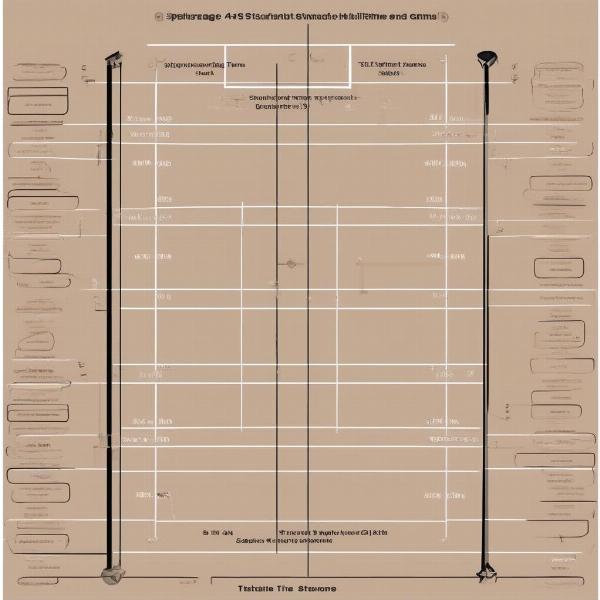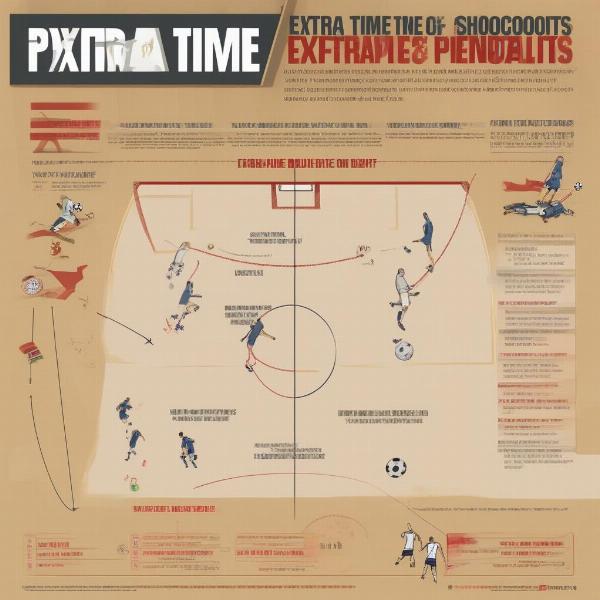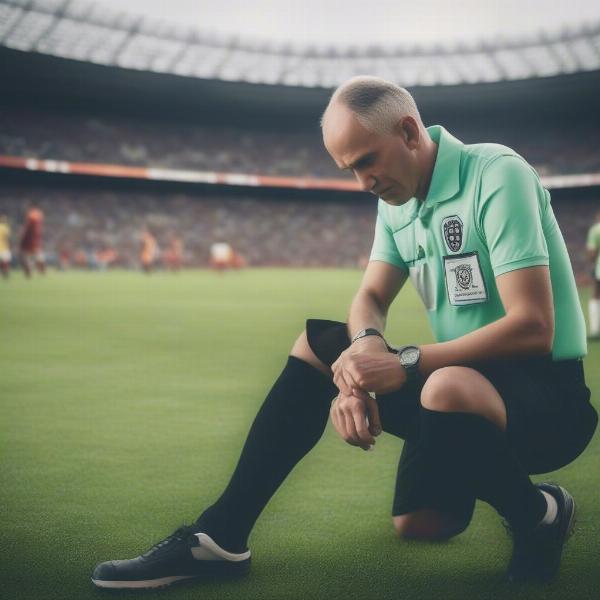Understanding the formal duration of a football game is essential for fans, players, and anyone involved in the sport. At SupremeDuelist.blog, we delve into the specifics of what constitutes a standard match, exploring the time regulations and what factors can influence the overall length.
This article will break down the official time structure of a football game, discussing the regulations, additional time, and various scenarios that can affect the duration. We aim to provide a clear, concise guide, covering everything from the regular halves to extra time periods.
The Standard 90-Minute Football Game: How It’s Structured
A standard football match, often referred to as soccer in some regions, is formally structured into two halves, each lasting 45 minutes. This totals 90 minutes of play, forming the bedrock of match duration. There’s a halftime break separating these two halves that typically lasts around 15 minutes, providing players a brief rest and a chance for strategic adjustments.
The 90-minute regulation time is a consistent standard across professional football leagues and international competitions. While variations exist in youth leagues or friendly matches, the professional game’s formal duration stays consistent. Understanding this 90-minute framework is crucial to grasping how additional time gets added when the clock runs down.
 explaining-official-football-match-time-structure
explaining-official-football-match-time-structure
What Factors Impact the Actual Play Time?
While the official time for a match is 90 minutes, the actual playing time can vary due to numerous factors. The addition of ‘stoppage time’ or ‘injury time’ is used to account for the numerous pauses in play, such as injuries, substitutions, and any other time-wasting tactics. The amount of added time is at the discretion of the referee.
Several factors can affect the total duration of the game:
- Injuries: If a player gets injured during the match, the referee will stop the clock to ensure the player gets the necessary medical attention. The time required for these stoppages is subsequently added at the end of each half.
- Substitutions: Each substitution briefly pauses the match, impacting the playing time. Similar to injuries, the time lost is generally added back.
- Time-Wasting: Players and teams who deliberately try to slow the game, such as taking too long during set pieces or when making a substitution, can also contribute to added stoppage time.
- Goal Celebrations: Although less impactful than other factors, excessive goal celebrations can also cause the referee to add some extra seconds to the clock
“The referee plays a crucial role in managing match time. Their decisions in adding time ensure a fair representation of actual game action,” explains Dr. Emily Carter, a renowned sports analyst. This added time makes the formal game duration dynamic, varying game to game.
Extra Time and Penalties: What Happens After 90 Minutes
In many crucial football matches, such as those in knockout tournaments, a draw after 90 minutes isn’t sufficient to determine the winner. When such situations occur, two additional periods of 15 minutes are played. This is commonly referred to as “extra time.” If the match is still tied after extra time, a penalty shootout is used to determine the winner.
How Does Extra Time Differ From Regular Time?
Extra time periods still adhere to the basic rules, but some key differences exist:
- Shorter Periods: Each extra time period is only 15 minutes, unlike the 45-minute regular halves.
- Halftime Break: A short break is provided between the two extra time periods but is significantly shorter than the regular halftime.
- Golden Goal: Historically, extra time matches sometimes used a “golden goal” rule, where the game would immediately end if a goal was scored in extra time. This rule is not common practice anymore.
 extra-time-penalties-deciding-match-result
extra-time-penalties-deciding-match-result
The Crucial Penalty Shootout
If the score remains tied after extra time, a penalty shootout is initiated. This is a high-pressure situation where each team takes turns with penalty kicks, until a clear winner emerges:
- Equal Numbers: Teams take turns with five kicks each, where teams must have all players take a penalty before any player takes a second penalty.
- Sudden Death: If the score is tied after the initial five penalties, the shootout proceeds to “sudden death” with each team alternating penalty kicks, and the first team to score a penalty where the other team misses, wins.
- Nerve Wracking: The pressure of a penalty shootout is immense, and many matches are decided during this tense period.
The penalty shootout represents a dramatic conclusion to a match that extends beyond the standard 90-minute formal game duration.
Why Understanding Formal Game Duration Matters
Comprehending the formal duration of a football game goes beyond just knowing the length of play. It allows for a deeper understanding of strategies, player management, and the flow of the match. It’s helpful for fans as much as it is for players and coaches.
“The strategic use of substitutions, understanding when to press or when to defend, and even how to manage a game effectively, all directly relate to the timing structure of football.” – Daniel Rodriguez, a football tactical analyst, highlights how crucial game duration is to in-game strategy. Knowing how time gets added allows for more precise play.
How Knowledge of Game Time Impacts Strategy
Knowing the standard and extra match duration can influence game plans:
- Pacing: Teams alter their pace throughout a 90-minute match depending on the score and game situation.
- Substitutions: Knowing when to make player substitutions or how best to use alloted substitutions is a key factor in the game.
- Time Management: Teams can intentionally manipulate the game clock to their advantage.
This knowledge impacts not just the players on the field, but also the fans in the stands and the ones watching from home.
Answering Your Questions About Football Game Duration
We know there are many questions surrounding the topic of football game duration, and we’re here to provide answers. Here are a few common questions we frequently receive at SupremeDuelist.blog:
How long is a regular football match?
A regular football match lasts for 90 minutes, divided into two 45-minute halves. There is a 15-minute halftime break between halves.
What is stoppage time in football?
Stoppage time, also known as injury time, is added by the referee at the end of each half to compensate for any time lost due to injuries, substitutions, or other delays.
What is extra time in football?
Extra time is additional playing time used if the match is tied after 90 minutes, generally in knockout matches. It consists of two 15-minute periods with a short break in between.
Why is there extra time in soccer?
Extra time is used in knockout matches to determine a clear winner, avoiding a draw. If the score is still tied, penalty kicks are used to decide the winner of the match.
How is the time kept in football?
The time is kept by the referee, who also monitors the time and decides how much stoppage time to add in each half. The referee’s timing is considered final and isn’t challenged.
Why does stoppage time vary?
Stoppage time varies based on how many delays occurred during the match. Injuries, time-wasting tactics, and substitution delays are some of the factors taken into account when assessing how much stoppage time to add.
 referee-controlling-football-match-time
referee-controlling-football-match-time
Wrapping Up: Mastering Football Game Timing
Understanding the formal duration of a football game, from the regular 90 minutes to the added time and extra periods, is fundamental for a deeper engagement with the sport. As highlighted throughout this analysis, a football game’s duration includes regulation time, stoppage time, and potential extra time or penalty shootouts. This understanding allows viewers to fully grasp the intricacies and dynamics of the game, appreciate the strategic nuances, and understand why a game might go past its allocated 90 minute window.
Here at SupremeDuelist.blog, we’re committed to providing you with insightful analysis of the sports we love. Whether you’re a fan, a player, or just curious about the formal duration of a football game, we hope this guide has been informative. Be sure to check back often for more articles breaking down the latest in sports!
Leave a Reply